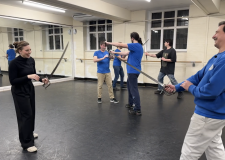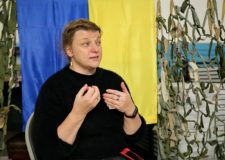City Reads 2012 short story competition
Erika Szostak has been announced the winner the the City Reads 2012 short story competition. Here is Erika’s winning story in its entirety:
Shine
I followed a lover to California because Ohio was cold and because he had eyes that glowed in the dark. We crossed the country in separate cars, my lover and I, he always leading and I always following, and truth be told, that should have been a clue. Isn’t that the way everyone arrives on those golden shores, chasing someone or something dangling just out of reach? Frank kept distance between us on that feverish drive; I was forever racing to catch up, a glimpse of his bumper forever disappearing around the next curve in the road.
When we arrived, it was August and I hoped I should like it there in Santa Barbara, with its predictable sunshine and leaves that never drop from the trees; this place where wilting blooms are clipped at the first hint of brown. Mythical southern California, home of eternal summer and happiness; how it had sounded like a respite from the dreary Midwest.
But it is all a lie. The sun bathes its southern California denizens in disingenuous cheer, like a lover who smiles over dinner while plotting to poison the soup. Under the spell of that deceptive luminuosity, it is all too easy to forget that it is a desert land, that the earth does not hold the warmth when the light fades, and so the temperature swings wildly in ways for which one is never prepared.
On our first night in town, our motel room featured a colored pencil drawing in a rickety frame – on plain white paper, an orange tree grew from a terra cotta pot. This was as close to nature as anything at the Orange Tree Inn, but it mattered little because I knew I had found our new home when I visited a tiny rental in the hills far from the city center. It lay over a mountainous pass, down a curving gravel drive past overgrown campers and rusted cars but no matter because in the cabin’s yard grew tangles of weeds and a real orange tree. This gigantic tree loomed over the cabin’s roof, its branches heavy with late season fruit, the grass littered with the rinds of oranges gutted by gluttonous ants. I loved the cabin, knew it was obviously meant for us. “It’s overbearing and too far from town,” said Frank when I showed him the little place and its riotous yard. “I don’t want to have to deal with that.” I signed the lease anyway, willing Frank to learn to love it. The cabin might be lonely but it would be ours.
Late season oranges produce the sweetest juice and the stickiest marmalade; how lucky I felt to have arrived at such an auspicious time of the year, predicting I would mark our yearly anniversary in our new town with special batches of the best orange juice and jam. I didn’t know then how much the tree would challenge me to keep up with its bounty, that it would never seem to rest for the winter. It bore fruit continuously and dropped it frequently, and as I spent more time trying to please Frank, doing those things he asked me to do – because he wanted variety – the longer I was obliged to let the oranges sit, the more I had to let them go to the ants.
During our embraces in that cabin, Frank started to keep his face turned from me, and when I tried to look at him, his eyes remained always obscured by the light. Where I couldn’t see his face, I could imagine only the faces of all the men I didn’t want to see, the ones leering at me so brightly, each the same in its overeager ogling. And then I knew I couldn’t please him anymore, that Frank’s love for me had passed into contempt communicated in pummels and hair-pulling, backs turned and kisses withheld, and all constancy seemed to pass away with it. When we arrived there, at first I thought, how wonderful that all the days were the same; what a comfort to have such stability, such consistency in one’s life – to know that every day one can count, at least, on the sun. No one ever mentions the way the sun’s golden glow shrouds the passage of time, the disorientation one feels in the midst of unremittingly perfect light. It seems to me here that the flowers and the fruit and the trees, those most obvious of seasonal markers, hardly change, and I never knew how keenly I looked forward to fall until I found myself surrounded by leaves of an unrelenting green.
The difficulty is that so much good fortune looks unearned in Santa Barbara; the light, the weather, the landscape – such abundance, sensuality and temperance. The bougainvillea surges across the landscape year-round, fuchsia and bold, as if it has always belonged there, has never not grown there. Lilies of the Nile line the streets, vivacious purple heads bobbing on stems slender and graceful as the necks of ballerinas, leaves circling them full as taffeta skirts. Like crowds of inescapable gossips, riotous birds of paradise bump heads in the breezes as if they’re whispering secrets into one another’s ears. One could chart a whole life in the names of Santa Barbara flowers; to reside in Santa Barbara means perennial goldfields, powdery liveforever, relax grass, rescue grass and velvetgrass, Adonis blazingstar, honeysweet, lady’s slippers, nipplewort, manroot, sticky seed, stork’s bill and baby blue eyes. I listen to these names, and I wonder what right does anyone have to such bounty, pleasures and fertility; to rewards without work; to deeds without consequence; to life without seasonal reminders of death?
For most of the year, the days melt too quickly there, one bleeding into the next, and I find I cannot remember with any kind of accuracy what happened when. The external signs of autumn, winter, spring, summer – nearly all unreliable. In the autumn, no crackling mounds of brown leaves beckon one to dive in because none have fallen from trees that shed only fruit. In that mild climate, the oranges grew and grew, and my wardrobe changed only in the same way: a gradual thickening of the layers from day to night rather than the drastic wrapping and shedding from inside and outside, month to month. So I cannot picture myself and say, yes, it must have happened in December, which I know because of the woolen cap and the turtleneck covering the scabs on my neck and my feet against an unyielding frozen ground. No, memory tells me I may have been sweating in a sundress, digging and digging at dry, crumbling earth, but that means nothing: sundresses and trowels are equally likely in March or October or July. One can never be sure.
Days passed. Weeks. A month. Or months? So gradually that I barely registered the change, my little house grew tidier, less cluttered, with fewer and fewer knickknacks strewn about. Where bunches of Frank’s dingy white socks had once sprouted from the floor like sudden blooms of cauliflower nothing now grew. A razor disappeared from the top of the sink, the wolf-shaped coffee mug from the kitchen shelf, and I stopped eating marmalades. I left the fresh-squeezed orange juice untouched, stopped leaving meals in the oven. The closets finally bare, I didn’t come home for days. Had he ever lived there or had it always just been me? The tree in the yard was overbearing – the sweet smell of the fruit cloying as it ripened, the flies and the bees constantly buzzing. Once I had pruned it, but someone must have given away my tools.
The smell dissipated during the bright, lonely winter I spent cooking for myself but the light remained constant. What a relief when September lumbered past August dragging its feet and I discovered a different kind of seasonal marker. Autumn may bring little relief from heat and sun though it shone a different kind of kind of light: even, hazy, soft. The orange glow on the horizon signaled hills radiant not with maturing leaves – stars pointing the way toward graceful exits, but fires fanned by Santa Ana winds, the approach of winter hand-delivering still more heat. Nothing ages gracefully in Santa Barbara, not even nature, everyone and everything too stubborn to know when it is time to stop clinging to worn-out life. But the fires burn it all into stumps, trunks like amputated hands clad in fingerless gloves, all the while an ashen smog smudging the sun. In this dull smoldering light, a blur enveloping the landscape, the air holds me close and everything is so much less exposed. This year, I will leave Santa Barbara for a place with grey winter skies and reliable darkness, but first I will take my oranges into the hills and I will watch the leaves fall down.
Read our interview with Erika in Latest News: profile





















